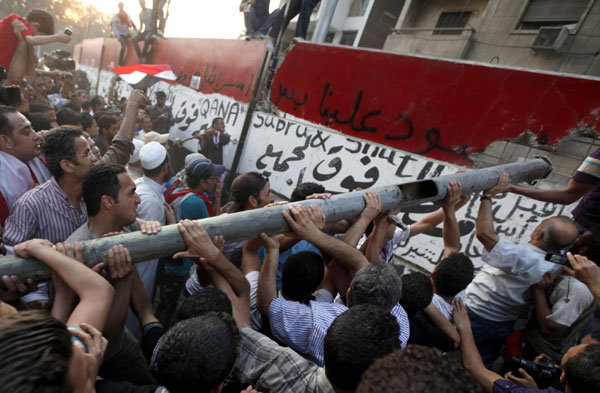Politics
Israeli envoy leaves after Cairo embassy attack
Updated: 2011-09-10 13:02
(Agencies)
|
 |
|
Protesters knock down a concrete wall built in front of the Israeli embassy in Cairo Sept 9, 2011. [Photo/Agencies] |
CAIRO - Israel flew its ambassador home on Saturday after Egyptians stormed the building housing the Israeli mission in Cairo, plunging Egypt's ruling army deeper into its toughest diplomatic crisis since taking over from Hosni Mubarak.
The United States, which has poured billions of dollars of military aid into Egypt since it made peace with Israel in 1979, voiced concern about the violence after protesters hurled embassy documents and the Israeli flag from windows.
Police fired shots in the air and teargas to disperse the crowd. Protesters lit tyres in the street and at least two vehicles were set alight near the embassy, located on the upper floors of a residential apartment block overlooking the Nile.
As dawn broke, about 500 demonstrators remained and a few threw stones at police and army vehicles and personnel. But police gradually pushed them further away and secured the area.
It was the second big eruption of violence at the embassy since five Egyptian border guards were killed last month during an Israeli operation against gunmen. That incident prompted Egypt briefly to threaten to withdraw its envoy.
Israeli ambassador Yitzhak Levanon, staff and family members arrived home on Saturday but one diplomat stayed in Egypt to maintain the embassy, an Israeli official said.
Egyptian Prime Minister Essam Sharaf called a cabinet crisis meeting for early on Saturday.
Israel is already embroiled in a feud with Turkey, formerly the closest of its few Muslim allies, over treatment of Palestinians.
"This action shows the state of anger and frustration the young Egyptian revolutionaries feel against Israel especially after the recent Israeli attacks on the Egyptian borders that led to the killing of Egyptian soldiers," Egyptian political analyst Nabil Abdel Fattah told Reuters.
Some politicians and activists criticised the violence, even if they backed the anti-Israel demonstration.
Presidential candidate Hamdeen Sabahy called for the army to take a "serious stance matching the public anger" towards Israel but said violence sullied the image of Egypt's uprising.
Last month, a man climbed up a flagpole on the building, took down Israel's flag and replaced it with Egypt's. Protests without such violence followed till the latest flare-up.
In response to daily protests, the authorities erected a wall around the building which was quickly defaced with anti-Israel slogans and then painted in Egypt's national colours.
HOSTILITY TO ISRAEL
On Friday, the wall was torn down after a demonstration in Cairo's Tahrir Square calling for speedier reforms and a deeper purge of officials who worked for Mubarak, the former president on trial on charges including conspiring to kill protesters.
The Interior Ministry said at least 450 protesters were injured. State television said 46 police were hurt.
During Mubarak's rule, Egyptians could never show such hostility to Israel without facing a crushing security response. Egypt's ties with Israel were a pillar of his foreign policy and buttressed his claim to be a regional mediator.
The treaty has sat uneasily with many Egyptians angered at what they see as Israel's mistreatment of Palestinians but it secures billions of dollars in U.S. military aid and access to top-notch warplanes, tanks and other equipment.
The army now in charge faces the dilemma between pursuing a more assertive policy towards Israel and protecting the treaty.
U.S. President Barack Obama called on Egypt to "honour its international obligations" and protect the Israeli mission. He told Israeli Prime Minister Benjamin Netanyahu that Washington was taking steps to resolve the situation.
An Israeli official said the ambassador, staff and family members left in one plane and a second one brought home six Israeli security personnel who had been left guarding the embassy, protected by a reinforced door as protesters massed outside. Egyptian troops were sent in to extract them.
"The fact that Egyptian authorities ultimately acted with determination is laudable. With that said, Egypt cannot let slide this harsh blow to the fabric of relations with Israel and the gross violation of international norms," Netanyahu said in a statement. He also thanked Washington for its role.
U.S. Secretary of State Hillary Clinton called Egyptian Foreign Minister Mohamed Kamel Amr to urge Egypt to meet its Vienna Convention obligations to protect diplomatic property, a senior State Department official said.
Demonstrators had used hammers, large iron bars and police barricades to tear down the wall outside the embassy building, erected this month by Egyptian authorities after protests over the killing of the five Egyptian border guards in Sinai.
The five died during an Israeli operation against gunmen who had killed eight Israelis. Egypt threatened to withdraw its ambassador from Tel Aviv. Israel has stopped short of apologising, saying it is still investigating the deaths.
Before moving on the embassy, demonstrators tried to storm a local police compound, hurled stones at the police and torched at least four vehicles. They also set alight a nearby public building. Security sources said 28 people were arrested.
The April 6 movement, which helped lead the anti-Mubarak uprising, said violence against the police vehicles and other property was perpetrated by those trying to "distort the image of the revolution". It blamed supporters of Mubarak.
E-paper

Way over the moon
High inflation rockets mooncake prices out of orbit for mid-autumn festival
From death matches to child's play
Tomb raiders remain a menace
Kicking for joy
Specials

Singing success
Western musicians bring much-needed impetus to live performance industry

Salary bonanza for bosses
Top boss gets 8.78 million euros a year, far more than the State enterprise CEO with highest pay

Kicking for joy
Swedish college student represents China in Taekwondo championships
